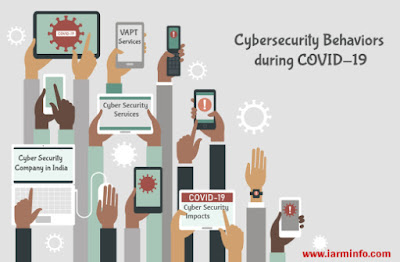Over several companies, the accelerated shift to a totally dispersed workforce due to sheltered orders has generated the slew of sudden and intense cybersecurity challenges.
IARM, a leading Cybersecurity company provides the Cyber Security Best Practices for Work From Home / Teleworking
According to survey 4,048 executive decision-makers across major business sectors in India, Australia,
France, Germany, Great Britain, Japan, the Netherlands, Singapore and the US. The study explored in this
COVID-19 case, the cyber threat happened where several people turned from home to work.
France, Germany, Great Britain, Japan, the Netherlands, Singapore and the US. The study explored in this
COVID-19 case, the cyber threat happened where several people turned from home to work.
Indian decision-makers were surveyed at around 520 people across small, medium and large firms, and the
Top Cybersecurity company in Bangalore found the following:
Top Cybersecurity company in Bangalore found the following:
- There was a 100x increase in COVID-19-themed malicious files from February through March aloneBut Indian companies remain alarmingly unconcerned.
- More than two-thirds (61 per cent) of Indian corporate leaders study revealed that everybody's company is even more likely to have chronic cybercrime in Covid-19 situation compared to a massive 45 per cent global one.
- Nearly one-third of SMBs (30%) assume that cyber-attacks are more likely to occur during COVID 19 now than it was before
- The study suggests whereby, in the current situation, nearly three-fourths (73 per cent) of prominent business decision-makers examined report says that by allowing personal devices to operate from home can cause attacks
- 9 Of the 10 business leaders and decision-makers surveyed in India, 9 believe that the devices they use at home are safe from advanced cyber threats
- In India 72 percent of people use personal devices to do their work, mostly laptops and mobile devices, while 93 percent use a combination of company-issued and personal devices.
- In India, nearly three-quarters (69%) work more often remotely as a direct consequence of the pandemic, compared to 56% worldwide.
- Smaller firms are less probable for using security firm-provided devices to work at home (35 per cent) medium to bigger businesses (68 per cent), which means they are at excessive or greater risk of not having the required security software deployed on individual measures to prevent cyberattacks.
- Surprisingly and curiously (62 percent) of the Indian companies surveyed, the maximum of all surveyed countries, have presented their
- employees with additional steps to help prevent threats while working remotely.
Organizations are under pressure to respond quickly to the rising number of cyber security threats. Even though there is a
need for information security services that committed to extending to be high, the number of workers required or the required combination
of knowledge and skills in cyber security is hard to predict with certainty.
need for information security services that committed to extending to be high, the number of workers required or the required combination
of knowledge and skills in cyber security is hard to predict with certainty.
If you have any queries or help please feel free to contact us IARM Information Security | info@iarminfo.com | www.iarminfo.com
Thanks
Priyadharshini


.jpg)
.jpg)

No comments:
Post a Comment